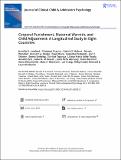Corporal punishment, maternal warmth, and child adjustment: A longitudinal study in eight countries
Publication Date
2014-07-01Author
Jennifer E Lansford, Chinmayi Sharma, Patrick S Malone, Darren Woodlief, Kenneth A Dodge, Paul Oburu, Concetta Pastorelli, Ann T Skinner, Emma Sorbring, Sombat Tapanya, Liliana Maria Uribe Tirado, Arnaldo Zelli, Suha M Al-Hassan, Liane Peña Alampay, Dario Bacchini, Anna Silvia Bombi, Marc H Bornstein, Lei Chang, Kirby Deater-Deckard, Laura Di Giunta
Metadata
Show full item recordAbstract/
Two key tasks facing parents across cultures are managing children’s behaviors (and
misbehaviors) and conveying love and affection. Previous research has found that
corporal punishment generally is related to worse child adjustment, whereas parental
warmth is related to better child adjustment. This study examined whether the association
between corporal punishment and child adjustment problems (anxiety and aggression) is
moderated by maternal warmth in a diverse set of countries that vary in a number of sociodemographic and psychological ways. Interviews were conducted with 7- to 10-year-old
children (N¼ 1,196; 51% girls) and their mothers in 8 countries: China, Colombia, Italy,
Jordan, Kenya, the Philippines, Thailand, and the United States. Follow-up interviews were
conducted 1 and 2 years later. Corporal punishment was related to increases, and maternal
warmth was related to decreases, in children’s anxiety and aggression over time; however,
these associations varied somewhat across groups. Maternal warmth moderated the effect
of corporal punishment in some countries, with increases in anxiety over time for children
whose mothers were high in both warmth and corporal punishment. The findings illustrate
the overall association between corporal punishment and child anxiety and aggression as
well as patterns specific to particular countries. Results suggest that clinicians across countries should advise parents against using corporal punishment, even in the context of
parent–child relationships that are otherwise warm, and should assist parents in finding
other ways to manage children’s behaviors.
Collections
- Department of Psychology [216]

